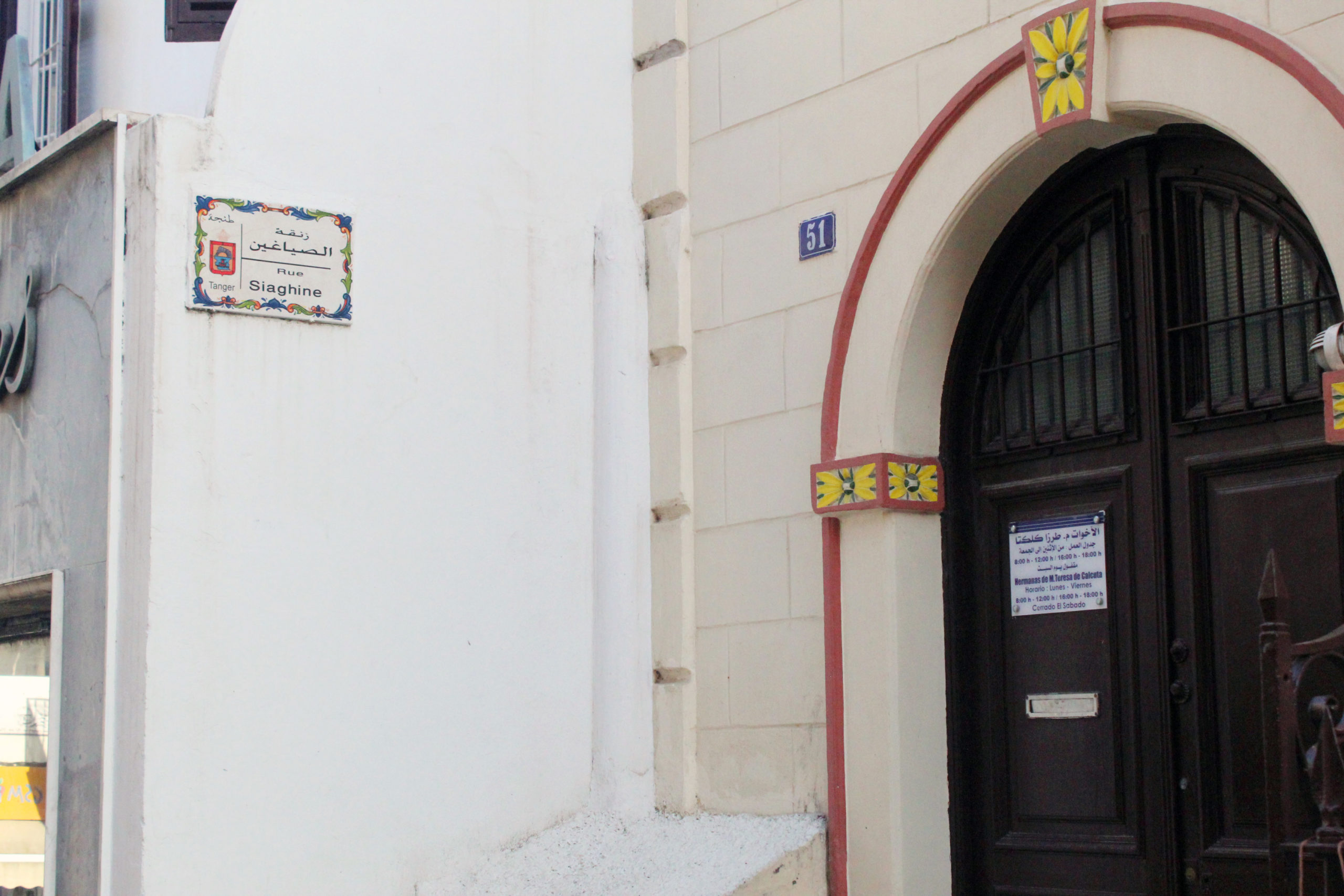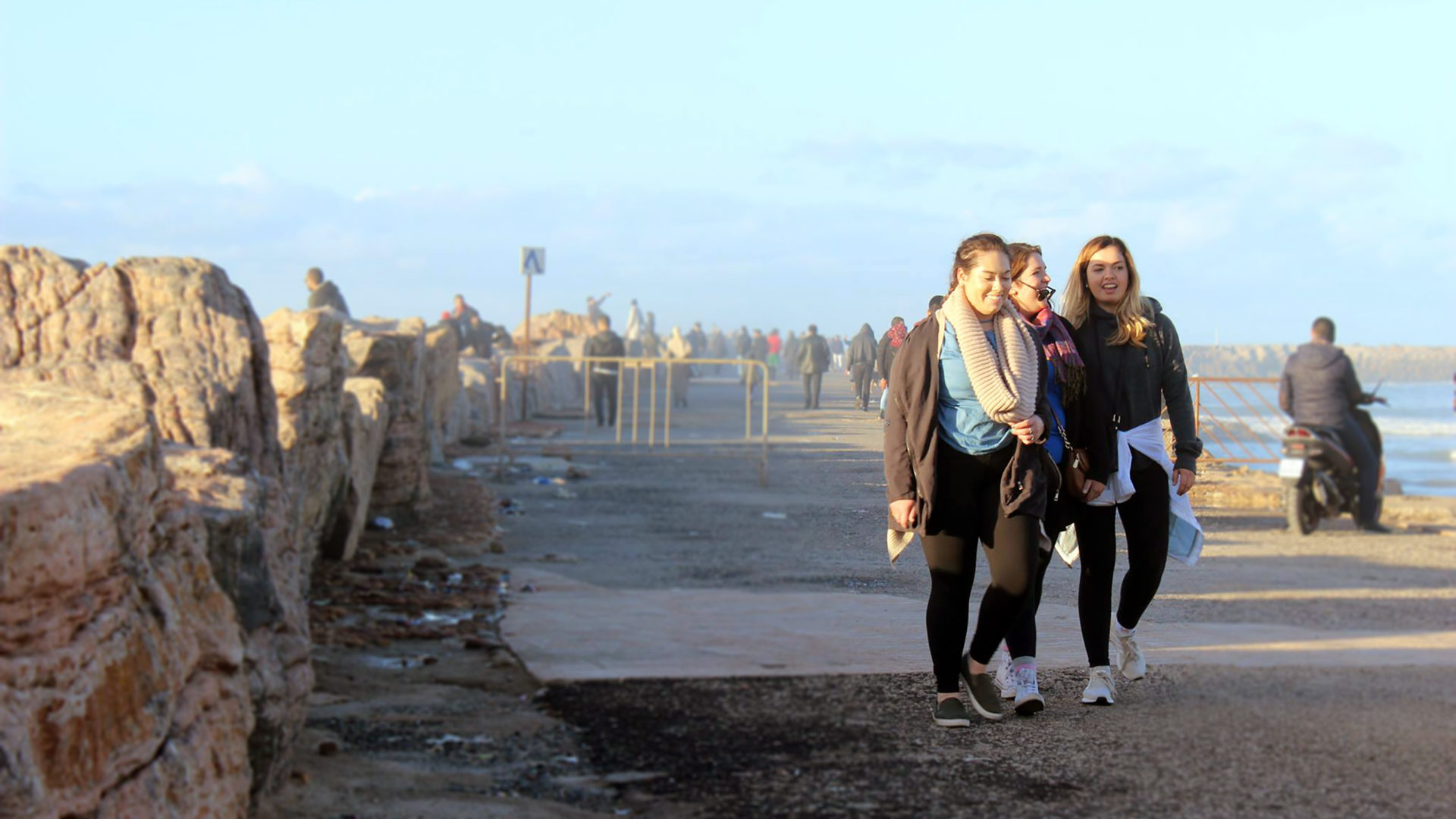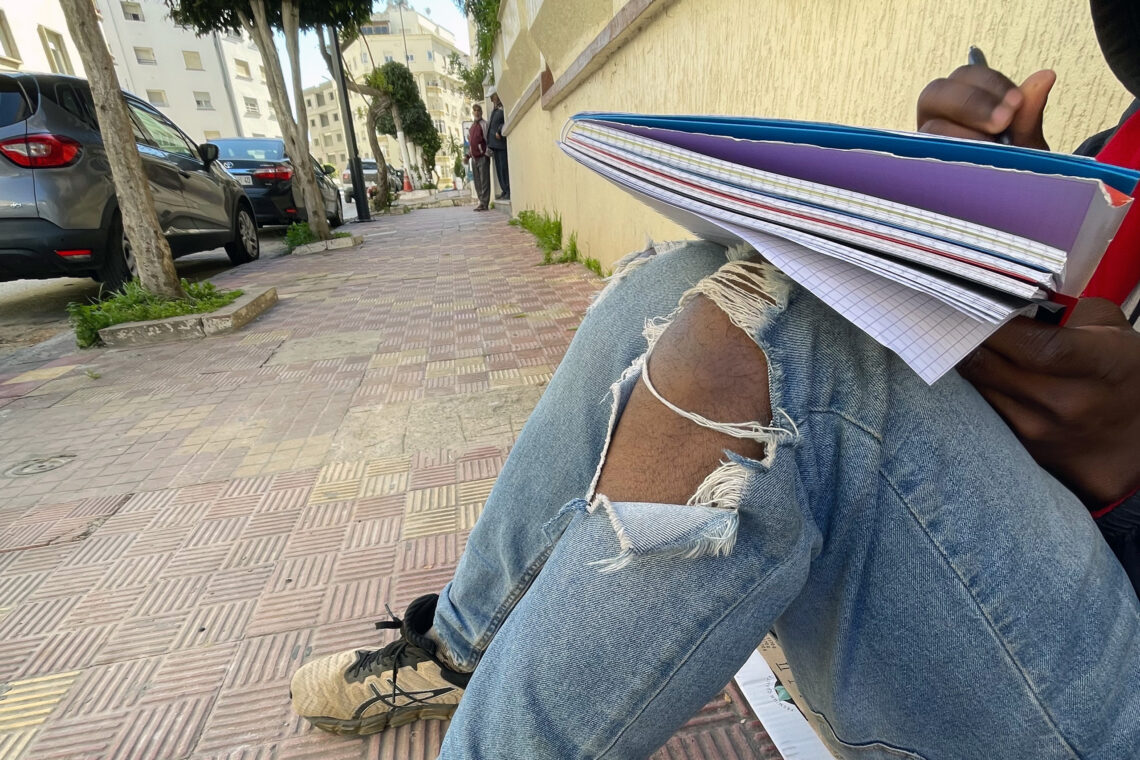Emma, Molly, and Taylor, three students in Tangier, left the Grand Socco, the old market, and entered the Medina through the large white gate. Passing Berber women selling vegetables from baskets, they continued onto Rue Siaghene, a narrow street where the Sisters of Charity is located. At the front door of the mission, nervous about what they were about to encounter, the women gently tapped the wooden door frame. A woman dressed in a royal blue nightgown slowly opened the door and, through heavy eyes, stared at them, confused. To break the awkward silence, the three students, in unison, cheerfully told the doorkeeper, “Hi, we’re here to volunteer today.”
The woman looked as baffled as before. “Where are you from?” she asked.
“We are here from the University of New England to volunteer, Emma said. “We met one of the sisters last week.”
Reluctantly, the woman swung open the door, let them in, and gestured for them to follow her through a narrow hallway that leads out into the courtyard. The three students, awkward and perplexed, did as told.

Once in the back kitchen, the woman leaned over the kitchen counter and began to speak Arabic to a few women standing behind a wall. The women peered their heads out to see the strange visitors. “This early?” one asked in English.
The doorkeeper, turning her back and heading toward the stairs, left the students in the hands of another woman, who spoke better English. Again, the girls were asked to explain who they were and what led them there.
“Our professor took us here on Thursday, and we spoke to one of the sisters about coming back to help volunteer,” Molly said. “And we actually set up…” Molly paused in the middle of her sentence because she sensed her explanation was creating even more confusion.
Another woman was hailed over for backup. This older woman, whose piercing eyes embodied power and leadership, stopped directly in front of them. There was an openness to her expression, and her eyebrows sunk into her rough skin as she spoke. “You are here for what?” she asked.
Emma spoke up to tell her that they were there to do a project on the Sisters of Charities. The woman, her welcoming face turning suspicious, began questioning them, unsure of their intentions.
“I understand that you’ve come to volunteer your time,” she began sternly, gesturing to her nun’s habit. “If you want to help us, you are welcome. If you want to take photos or videos or interview us, you cannot be here. We are very private and will stay that way. We do not use Facebook, or Twitter, or other social media. We do not wish to be on the Internet. You must not post anything!”
Apparently satisfied with the students’ explanation that they were there to give to orphans and not heap “likes” on their social media accounts, the nun escorted them up a long wooden staircase. She halted on the first floor where doors opened to a tiny room with several nooks and crannies, and where laughing volunteers lay stretched out on the floor, cuddling and playing with orphans. Immediately, smiles broke out on the three students’ faces as they took in the scene of the beautiful, happy, and healthy babies.
“I can take one of you in here. The rest go upstairs to work,” the sister said to the students in the rushed voice of a very busy woman.
Emma said she would stay, while Molly and Taylor said their goodbyes and continued up to the top floor.
Setting foot in a room filled with twenty or so tiny infants, all under the age of one, none walking yet and only a few crawling, Emma was greeted by several Spanish-speaking volunteers.
“Thank God,” Emma said to herself, relieved that she wasn’t the only foreign volunteer in the room.
As soon as Emma settled in on the floor, one of the volunteers handed her a fussy child. Her task, of course, was to comfort the baby. The moment the child settled into Emma’s arms, her eyes began to look heavy. After fighting sleep for just a moment, the baby was lulled to sleep. Emma looked around at a room full of smiling, chubby babies who craved attention and love. She breathed a sigh of relief, knowing she’d done the right thing by volunteering at the mission. For at least an hour or two, she could give the orphans the love they needed.
After switching back and forth from playing on the floor and rocking babies to sleep for about an hour, it was time for lunch. Again, Emma was handed a baby and a bib, and she didn’t need instructions to know that she had to put the child in his high chair and feed him. The baby, cheeks rosy and plump, smiled at Emma; he knew exactly what time it was. Several months old, the baby felt heavy in Emma’s arms, and from the looks of him, he wasn’t one to miss meals. At least, Emma thought, the children were cared for and healthy. She placed the little boy in the chair and slid the tray in. The baby instantly started giggling, excited to see what was on the menu for lunch. A volunteer handed Emma a bowl of pureed veggies and she started to feed the child. Other volunteers took turns feeding the fifteen babies in the room, some with bottles and others with baby food.
Following feeding time, Emma helped the babies go down for a nap. She held each tiny baby in her arms and rocked and sang until they closed their eyes, gently and peacefully. As the children fell asleep, Emma began reflecting on what it meant spiritually for her to be here. Being raised Catholic, she’d always admired Mother Teresa’s charitable work with the poor and sick, and more specifically her willingness to work with people with leprosy, a population abandoned by everyone else. The charitable part of Emma’s faith made her think of ways she could help others when she got back to Maine, just as she was volunteering with the orphans in Tangier. In that moment, Emma made a promise to herself to give back in whatever way possible.
As soon as the babies were sound asleep, the sisters and volunteers took them in their arms and placed them in their cribs in another room.
Molly and Taylor, upon first entering the old, run-down toddler room upstairs, heard the shrills of babies and saw the frantic but smiling volunteers.
“Go play, jump in,” the sister instructed as she gestured to the two students to make themselves at home. Taylor and Molly were surprised by the number of kids contained by the tiny room, but to their amazement none of the kids seemed neglected or unhappy, despite the obvious lack of volunteers and workers. All twenty-five children had clean, jolly faces, neat and tidy garments, and bellies full of home-cooked meals.
Toddlers crowded around the entrance as Taylor and Molly fought their way inside the door. Within seconds, the kids wobbled up to them, grabbing onto their legs and claiming their territory. Taylor and Molly set about swaddling the kids and rocking them on the seesaw.
After an hour of nonstop play and happy babbling, a commotion broke out. It was obviously time to eat. Two women wearing eggshell colored robes, traditional hijabs, and sky-blue slippers came rushing in with large baskets and started nonchalantly throwing toy after toy inside. Emma now rejoined Molly and Taylor, and the three students pitched in until the floor was clear of dolls and baby books. Music broke out and the kids started to cheer and sway to the soothing rhythm of the hymn. The door to the dining area then flew open, and the older toddlers rushed to their seats, while the little ones were lifted into their chairs.
There were five volunteers, including Emma, Molly, and Taylor, to feed twenty-five children. Most of the children needed to be spoon fed. On most days, even fewer volunteers are on hand, and the sisters, staff, and whatever volunteers on hand—often there are none—feed, change, potty train, and put down the children for a nap, all the while cooking, tidying and cleaning, and entertaining the kids while they are awake. This kind of work is a full-time job that comes with only the pure satisfaction of providing for those who can’t provide for themselves.
No matter where Emma, Molly, and Taylor turned their heads, they were always staring at a portrait of the admirable Mother Teresa, known in the Roman Catholic Church as Saint Teresa of Calcutta. Her face served as a reminder throughout the day that when things seem overwhelming and impossible, the point of work isn’t to be easy or to flatter the ego, but to do God’s work by helping the less fortunate.
“Safi”? a nurse asked the three students after they put down the bowls and wiped the soft cheeky faces of the satisfied toddlers.
“Safi” they replied with smiles sweeping across their faces. Each started lifting the kids out of their chairs and letting them wobble into the next room for their naps.
“Huwa andu kay msi toilette,” said the nurse pointing toward the gate.
Confused by the speed of what she said, Taylor walked out of the gates while rocking the child. Taylor soon walked back in, clearly unsuccessful in completing whatever the mission she’d been assigned. Sighing, the woman pointed towards the baby’ bottom, and Taylor broke out into laughter and found her way to the bathrooms.
As she entered she noticed stains on the walls. Water dripped from the pipes into a puddle on the floor, where a row of toddlers stood waiting for their turn to be changed by a lanky, slender woman who hummed sweet tunes, brightening up the atmosphere. Along one side of the wall, five toilets were lined up, but none of the children was ready to use them yet. Instead, they sat on them, giving their tiny legs a break from the strain of standing. As Taylor dropped the sweet, sleepy boy off to get changed, the woman gestured for her to approach.
Only one nun was working in the room to satisfy the needs of all the kids, and she did so without complaint. Each child she hoisted up on the unsteady changing table, and the sister then swarmed the children with kisses and tickles until the laughs echoed into the other rooms.
“Mira, Mira, Mira!” she motioned to Taylor, insisting she watch the process of a diaper change.
Taylor complied, smiling and nodding her head despite the pungent stench. After all, how could she refuse to participate in watching such love and joy? The fact that the sister’s entire day consisted of changing dirty diapers didn’t seem to dull the happiness she radiated.
While Taylor was in the bathroom, in a different room Molly lifted a child out of the tiny wooden chair and brought her into a room lined with cribs. A sister gestured to her to help get the little ones ready for nap time. The toddlers knew what time it was and waited at the end of their cribs to be placed inside where they could rest their eyes. Another worker came into the room to help place the babies in their designated cribs.
At this point, Taylor rejoined Molly and helped with getting everyone down for a nap. One sister came over to the girls and started making circular motions with her hand over the cribs. Confused by this, the girls looked at each other, trying to figure out what they were trying to get across to them. The sister then pointed to the back of an infant laying in the crib trying to stand up. Then it hit them: they were to rub the toddlers’ backs in order to help them fall asleep. Taylor and Molly looked at each other with wide smiles as they gently drew circles on the toddlers’ backs.
The three students left the room and stood in the sitting area as the sisters made sure all the children were asleep. One of the sisters came out, shut the door behind her, and whispered with a soft smile on her face that they were all asleep—music to everyone’s ears. For the sisters, especially, nap time allowed them finally to catch their breath and get their heads on straight. It was not long before they were back on their feet completing another task. This time it was washing up from lunch and making sure everything was clean, put away, and brought back to their proper places for the next meal.
Taylor and Molly stood waiting in the playroom, unsure of their next move, while the kids slept and the cleaning ladies quickly burst into the room. One sister, after forcefully sweeping the play mats and mopping up mashed up couscous from lunch, got their attention. She mumbled something in Arabic and Spanish, but both Taylor and Molly struggled to understand even one word. One of the other volunteers came to the rescue by translating. “The sister wants one of us to go behind the counter and start washing the dishes.”
Without hesitation, the two girls joined their new friend behind the counter and starting washing and drying the cooking ware. After about 30 minutes of work, the girls were officially done and stepped out of the kitchen to signal everything had been taken care of.
Meanwhile, Emma was upstairs, where she reluctantly handed the child she was holding to another volunteer, took one last look around at the beautiful sleeping infants she’d just begun to feel so connected to, and left the room to meet Taylor and Molly in the doorway.
Making eye contact with the nuns, the three students spoke up—“Bslama, adios, muchas gracias, shukran!”—to signal to the women that their day at the mission was complete.
As Molly, Emma, and Taylor walked down the creaky steps of the mission and out into the fresh air and warm sunshine, they felt renewed, not just because they are Catholics who did something for God, but because just a few hours with the kids had restored their spirits and sense of love. Those kids touched and changed their perspective and made lives so much better. The only thing the toddlers wanted was love, attention, and human contact. After a semester in Tangier, the three students can say that happiness is not found in what we can buy and own, but by the relationships we nurture.
Reflecting on what the sister had said about being there for the right reasons, Molly, Emma, and Taylor realized what an important lesson they had learned. Most of us want to be applauded for even the smallest of gestures, such as holding the door open or giving someone advice. What many struggle to understand is that doing something that benefits another life, whether human or animal, doesn’t need to be followed with praise. The sisters work behind closed doors and never want to be known for their work. They are models for us. Everyone should strive to give back in the way they do.






Comments are moderated by the editor and may not appear on this discussion until they have been reviewed and deemed appropriate for posting. All information collected is handled in a manner consistent with our privacy policy.